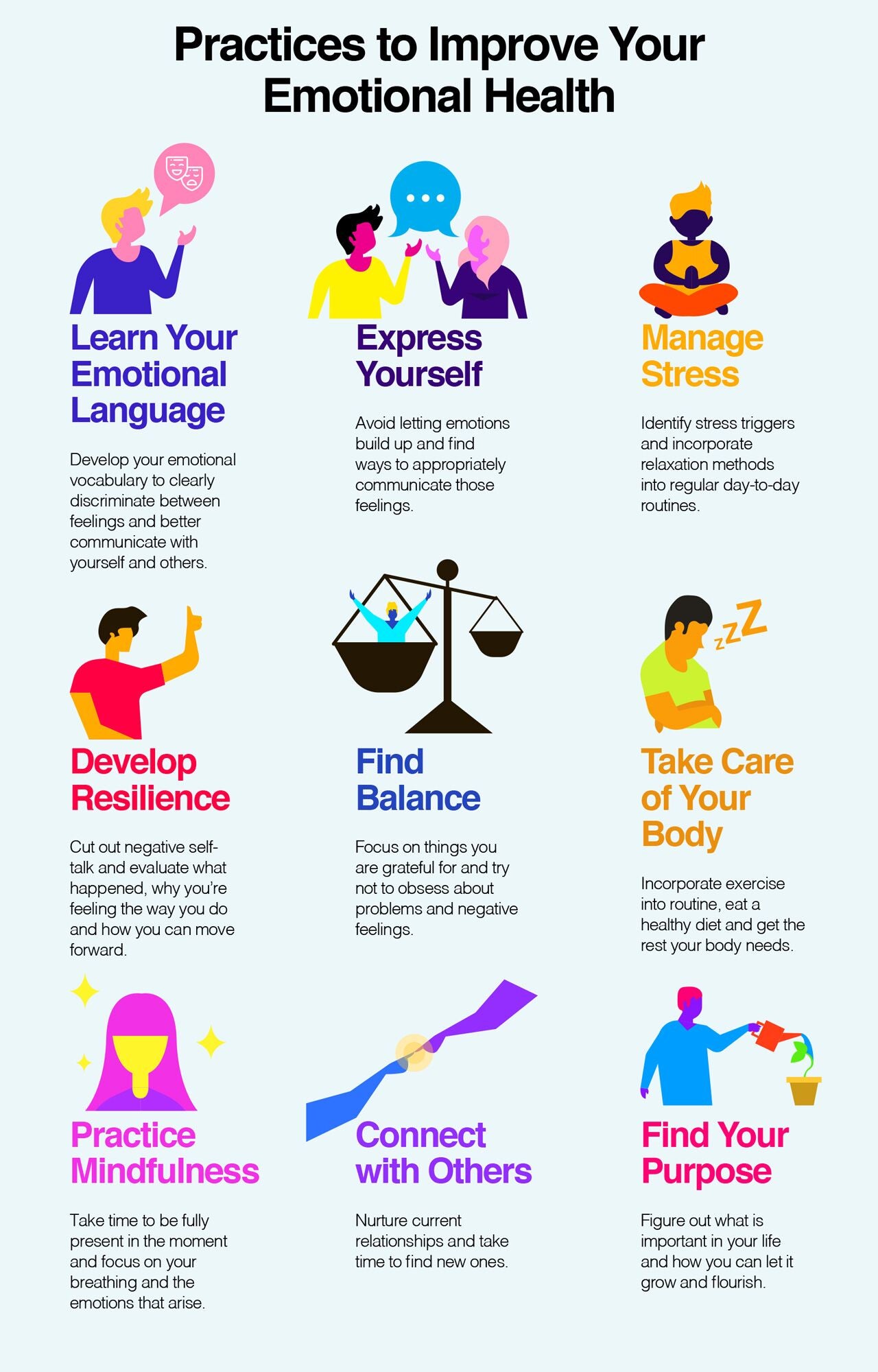What Is Emotional Health and How to Improve It
 By: by Amino Science
By: by Amino Science

Taking care of our bodies is often the focus when we think of our health. We concentrate on eating right, exercising regularly, and getting enough sleep. Having a strong body will definitely improve your energy and health, but often times we forget to nourish our minds too. Your mental health is an integral part of your overall well-being and deserves equal attention when pursuing a balanced, fulfilling life. Learn why feeding your psychological side is as important as feeding the biological, and simple practices you can follow to improve your emotional health.
What Is Emotional Health?
Your emotional health involves your thoughts, feelings, and how you process events, stress, relationships, and changes that occur throughout your life. We have a continual emotional interaction with whatever is going on around us, and it fuels our actions and how we choose to express ourselves.
Our feelings generate a ton of energy, and you may recall a time when you reacted to a person or incident with a great deal of emotion, maybe causing the interaction to not go as well as it could have. Even when our feelings are appropriate for the situation, we may feel overwhelmed and not know how to handle what is happening or how to cope.
Emotionally healthy individuals are able to identify and process their emotions in appropriate ways to minimize stress and neutralize an overly negative frame of mind. Emotional health isn’t about being happy all the time; it is about having the ability to understand and respond to the spectrum of emotions with thoughtfulness and confidence.
Why Is Emotional Health Important?
Taking care of your emotional health helps you realize your full potential and more feely embrace life, even when challenging or upsetting things happen. Effectively managing stress, anger, and sadness not only positively affects your mental state, but also supports your overall health.
Research shows that a positive outlook directly influences physical health and can reduce your risk for certain diseases, decrease blood pressure, and prevent weight gain. Referred to as the mind-body connection, your body reacts to the way you think, feel, and act.
Your emotions are so powerful that they can positively or negatively affect your biological functioning. All the systems within your body, including your emotional responses, share a common chemical language and are constantly communicating with each other. It is essential to work through emotions as they arise, especially when you’re feeling anxious or angry, so it does not turn into long-term physical or emotional problems.
How to Improve Your Emotional Health
Nourishing your emotional health takes time and certain skills. There are several practices you can adopt to improve your emotional well-being and enjoy a more balanced and gratifying life.

Learn Your Emotional Language
Living an emotionally rich life necessitates fostering a strong relationship with your feelings and developing effective communication skills. While there is no Rosetta Stone for learning your own emotional language, with practice and experience, you will be speaking the dialect in no time. Developing your emotional vocabulary helps you clearly discriminate between feelings and better communicate with yourself and others about those emotions.
So, what do we mean by your emotional vocabulary?
While many people might simply say they are feeling “bad,” emotionally healthy people can pinpoint whether they feel “irritable,” “frustrated,” “defeated,” or “anxious.”
The more specific your word choice, the better insight you have into exactly how you are feeling, what is causing it, and what you can do about it. You cannot clearly communicate something if you don’t first know how to identify it. Once you narrow down what word best expresses your current emotional state, you can often determine the underlying cause and reveal how to constructively deal with it.
An added benefit of establishing your own emotional language is that you become more empathetic to the other people in your life and gain a better understanding of their reactions and emotions. This allows for more open conversations and fewer misunderstandings and miscommunication.
Express Yourself
Suppressing feelings of sadness or anger adds to your stress level and can strain relationships at work or at home. Finding appropriate ways to let someone know something is bothering you prevents that negative emotion from building up and causing an outburst at a later time.
For example, you could say, “I feel very frustrated when you do not listen to what I have to say. It makes me feel insignificant and overlooked. I really have something I would like to discuss. Can I please have your undivided attention for a few minutes?” Oftentimes others do not realize how their actions affect you.
It is also important to express your feelings to yourself by giving them a name and a voice. For instance, “I am feeling extremely hurt right now because of a recent fight with a friend. Some of her unkind words really offended me and I’m angry right now, but that’s ok. It is completely acceptable to feel upset and to express these feelings in a healthy way. I need a little time to process it calmly before I move forward.”
If bigger issues pop up and you need help working through those feelings, do not hesitate to reach out to a family doctor, counselor, or religious advisor for guidance or to seek help from a support group.
Manage Stress
Stress is a natural part of life, and in small amounts can be beneficial by providing extra motivation and energy, as well as protection by elevating your senses. But when stress reaches high levels, especially for long periods of time, your overall well-being will feel it.
Watch out for signs of stress overload like irritability, anger, headaches, changes in your sleep or appetite, and anxiety. It’s important to identify your triggers and to find stress management methods that help lessen the impact of the person, activity, or event that causes it.
Eliminating all negative stress from your life is impossible, but incorporating relaxation methods into your regular day-to-day can reduce stress immensely. Meditation, yoga, deep breathing, listening to music, taking a walk, or partaking in your favorite activity can do wonders for lowering your blood pressure and calming your mind and body.
Develop Resilience
Emotionally healthy people are often resilient when faced with challenges or disappointment because they have a deeper level of self-confidence and a belief that they can navigate through any of life’s difficulties. Turning lemons into lemonade isn’t always simple to do, but it does get easier with practice as you become more in tune with your feelings and emotional responses. Cut out the negative self-talk when things do not go your way and take a step back to evaluate what happened, why you’re feeling the way you do, and how you can move forward.
For example, if you were to suddenly lose your job and are left feeling worried and scared, you want to allow those feelings in, but do not let them overwhelm you. Instead take it as an opportunity to reevaluate where you stand. Is this the career path I want to stay in? Is there something I have always wanted to do? Don’t let your self-esteem take a hit. It’s a matter of saying to yourself that sometimes unfortunate things happen, but no matter what, I’m going to learn from this and keep moving forward and enjoying my life.
Find Balance
Trying to gracefully manage the balancing act between work, home, family, and obligations is often like walking a tightrope. Certain areas of your daily life demand more attention, and it’s difficult to find time to fit in all the things you would like to be doing.
Making time for fun is easier said than done, but it is essential to your emotional health and level of happiness. Schedule time on a calendar, make dates with friends and family, or set a reminder to step away even for 15 minutes to focus on something that brings you joy. It’s also important to avoid being overcommitted and stretching yourself too thin. Only say yes to the people and activities you want to be involved with to ensure you still have time for yourself.
When it comes to emotions, you want to find balance here too. Focus on the things you are grateful for in your life and try not to obsess about your problems and negative feelings. Allow space for the uncomfortable emotions but don’t let them take over the show.
Try keeping a journal to write about what makes you feel happy, grateful, and peaceful. Also allow time to process the negative feelings, as writing about them can be very cathartic and help in letting them go. Finding balance allows the positive outlook to shine through and supports your overall emotional intelligence and welfare.
Take Care of Your Body
As discussed above, the mind and body are powerful allies. Making an effort to incorporate physical activity into your routine, eating a healthy diet rich in vitamins and minerals, and getting the rest and relaxation your body needs reduces anxiety, lifts self-esteem, and improves cognitive function.
Exercise floods the body with feel-good endorphins and provides a healthy distraction from your stress and problems. Plus, making a conscious effort to live a healthy life builds confidence and adds a sense of control to the occasional frenzy.
Find others who enjoy the same activities or discover a new hobby that challenges and excites you. Bottom line is when your body feels good, your mind can’t help but follow.
It's also important to feed the body the nutrients it needs for mind-body balance, especially essential amino acids responsible for producing hormones in the brain, like the feel-good hormones dopamine and serotonin. It's as easy as taking a daily essential amino acid supplement.
Practice Mindfulness
Life can be busy. You try to simultaneously make dinner, fold the laundry, and text back a friend, all while worrying about the huge presentation you have in the morning. When you’re preoccupied with the task at hand and rushing to check off everything on your to-do list, it’s difficult to be mindful of the moment, and you may very well miss what is happening right in front of you.
When you are focused intently on the moment, accepting all emotions whether they are positive or negative and tuning in to your inner self, you are practicing mindfulness. This practice is intertwined with meditation and is involved in stress reduction and maintaining emotional balance.
When you are mindful, you connect with life, you notice the beauty in things, and find a deeper appreciation for your loved ones, peers, and strangers. When you are in the moment, worries and tasks take a back seat and you feel less pressure about the past or the future, which can help alleviate any self-doubt or nagging negative emotions. Mindfulness means embracing all experiences, no matter how challenging, rather than avoiding them out of fear or discomfort.
Concentration meditation techniques, as well as other activities such as tai chi or yoga, can induce the well-known relaxation response and help you connect with the present moment. You can do a more formal exercise where, through meditation, you focus on your breathing and the emotions that arise, or simply try to incorporate mindfulness into your everyday life.
Take a moment while you’re eating, walking, playing with a child, or driving to become hyperaware of what is going on around you and the sensations you’re feeling. Try to keep your mind focused, slow down the process, and be fully present by allowing all your senses to activate.
Connect with Others
We are social creatures and need to have healthy, fulfilling relationships in our lives to feel connected, supported, and valued. Friends and family help boost our emotional well-being and give us the inspiration we need, especially in trying times. In fact, 71% of people turn to friends or family in times of stress. Having people to count on gives us the perspective and validation we sometimes need to keep us headed in the right direction.
Nurturing our social connections, and not just through social media but through actual face time, can help us feel happier and more secure, and can give us a greater sense of purpose. Research suggests meaningful relationships are a prescription for better emotional, mental, and physical health.
If you feel your current connections don’t provide enough support, you can take steps to form new ones. Join a club in your community, take on a new activity, enroll in a class, or volunteer. You have a good chance of meeting like-minded people who share your interests and of finding someone you can connect with on a deeper level.
Find Your Purpose
“To give life a meaning, one must have a purpose larger than self.”
Having a sense of purpose is strongly linked to better physical and emotional health. Figure out what is important in your life and how you can let it grow and flourish. Whether you love your work, family, volunteering, teaching, caregiving, a hobby, or a talent—discover what makes you special and gets you out of bed in the morning.
To help discover your higher purpose, take a little self-reflective journey and find out what makes you tick. Creating a vision board is a great way to allow your mind to run free and answer the question, “What do you want to do more of in life?” You can create an online version or the good ole-fashioned poster board kind where you cut out pictures and words that inspire you and paste them to your board. See what story and patterns begin to emerge. You can gain a great deal of clarity about your passions and desired path when you start to piece together the things that represent your happiest, healthiest self.
As with physical health, maintaining good emotional health is an ongoing process that requires continual work over time. By continually applying yourself and developing a positive mindset, you can achieve your optimal emotional health, help guard against future health problems, and live a gratifying, vibrant life.

Up to 25% off Amino
Shop NowTAGS: natural cures
Join the Community
Comments (0)
Most Craveable Recipes




 833-264-6620
833-264-6620



















